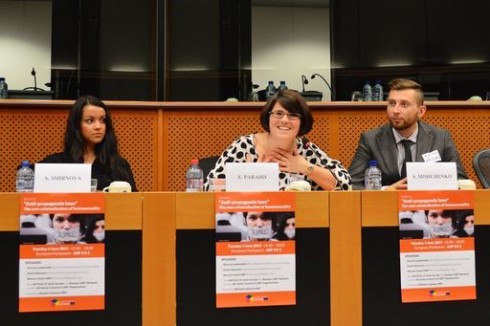UN Human Rights Council: “Traditional values” subverting the international human rights framework
@curlyP @GeorgeKCharonis Look at ARTICLE 19’s recent statement following discussions at EP on this:
UN Human Rights Council: “Traditional values” subverting the international human rights framework
ARTICLE 19 raised with the European Parliament its concerns at efforts made by Russia at the UN Human Rights Council (HRC) to call for recognition of “traditional values” as a vehicle for the promotion of human rights. Russia has successfully tabled three resolutions at the HRC since 2009, most recently in October 2012. We consider this to be part of a broad agenda by Russia to subvert the international human rights system, and to distract the HRC from its mandate of protecting and promoting human rights.
The resolutions tabled by Russia fail to advance a definition for “traditional values”, which is a vague concept alien to the human rights framework. Rather than support the promotion or protection of human rights, concepts such as “traditional values” have often been invoked to justify abuses against the rights of vulnerable minorities including LGBT people. These resolutions fail to acknowledge this fact, exposing the insidious agenda behind their attempts to seek recognition for the concept in the international human rights framework.
ARTICLE 19 believes that the rights contained within the Universal Declaration of Human Rights represent a coherent and universally agreed-upon framework for protecting the rights of all human beings. Traditions contrary to these standards must be modified or, if necessary, eliminated.
It is clear that Russia will not confine its “traditional values” agenda to the UN at Geneva or in New York. It is therefore important that the EU is aware of this attempt by Russia to qualify its human rights commitments in a vague manner and that the EU stands in firm opposition to this. The EU must act decisively and robustly to ensure that the negative trends are reversed.
At the same time, the EU and its member states must robustly support initiatives to promote equality on the basis of sexual orientation and gender identity on the international stage. The EU should firmly encourage the HRC to follow up its landmark resolution 17/19 of 2011 on human rights, sexual orientation and gender identity. This led to a ground breaking OHCHR report on the issue. Given the developments highlighted above, it is clear that keeping the rights of LGBT people on the international agenda is as important now as ever before.
en.wikipedia.org/wiki/Minority_rights
#previous #article #humanrights #traditionalValuesUN
deinayurveda.net/wordpress/2013/02/traditional-values-vs-human-rights-at-the-un
en.wikipedia.org/wiki/Universal_Declaration_of_Human_Rights
In 1966 the General Assembly adopted the two detailed Covenants, which complete the International Bill of Human Rights; and in 1976, after the Covenants had been ratified by a sufficient number of individual nations, the Bill took on the force of international law.[1]
en.wikipedia.org/wiki/International_law
Comments are closed.

